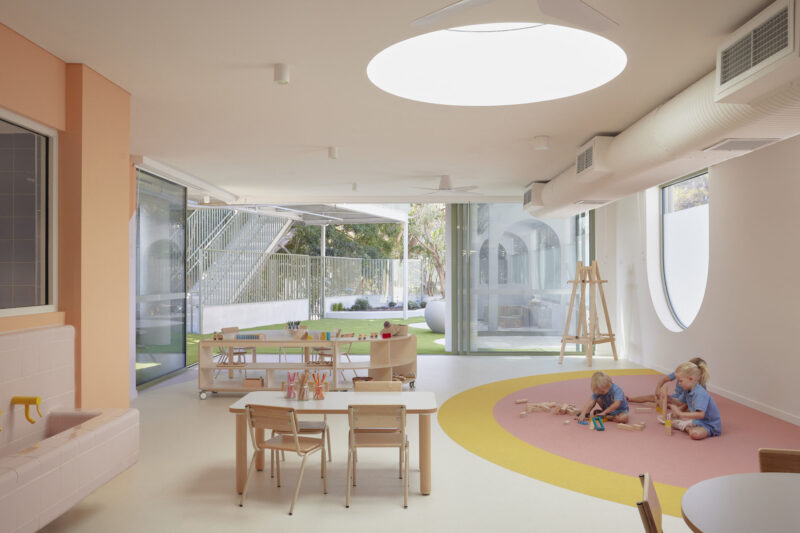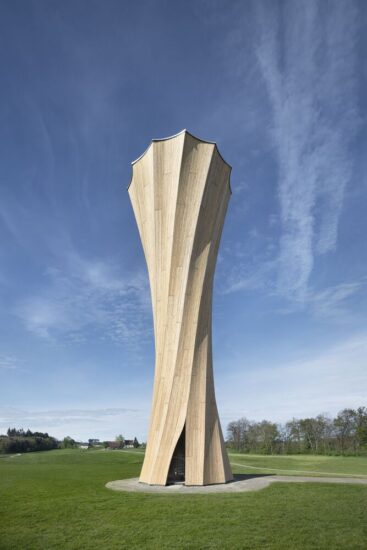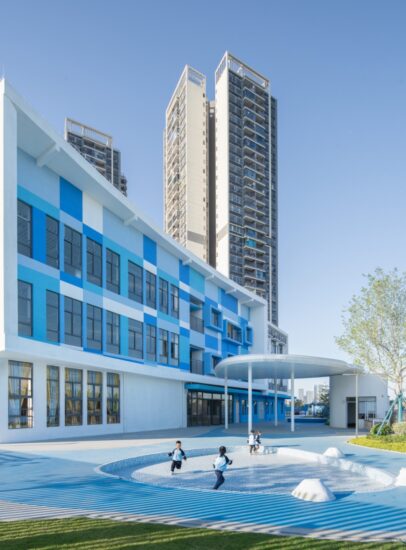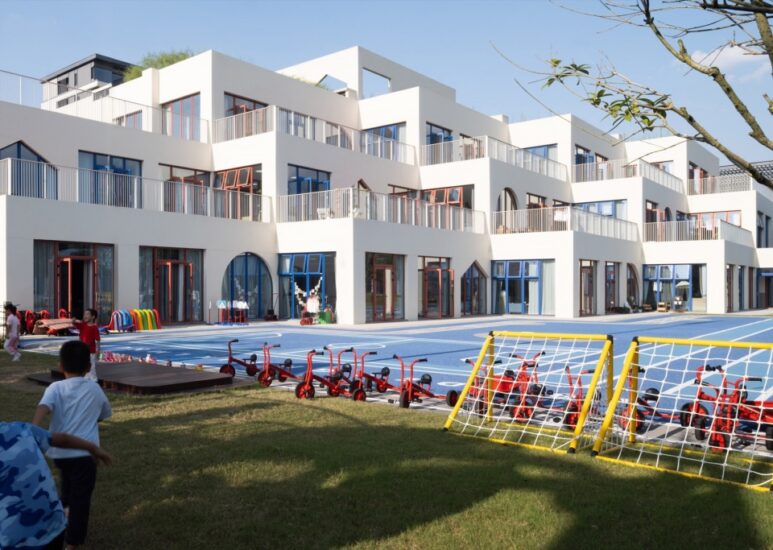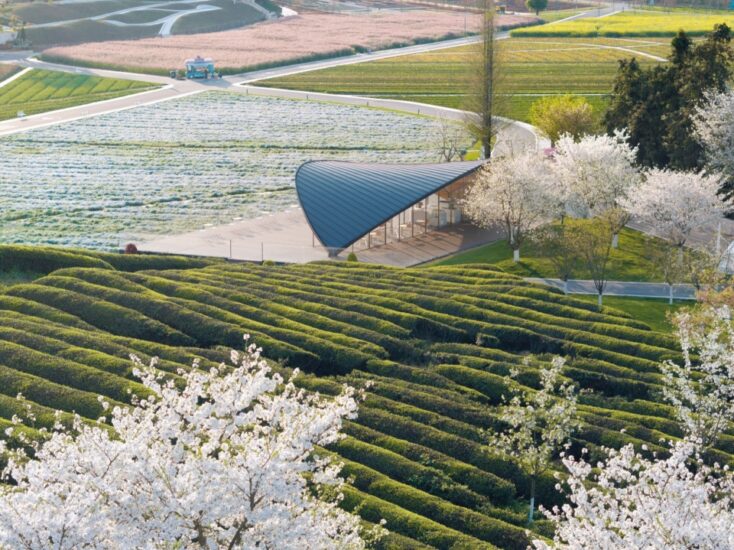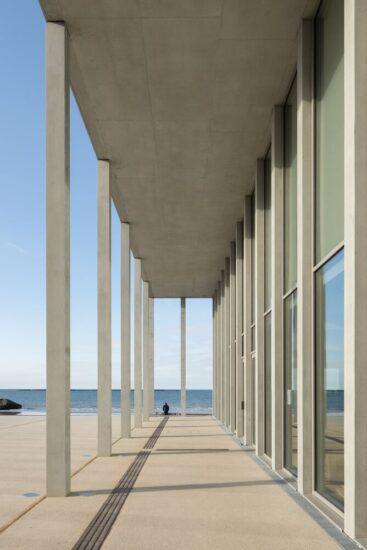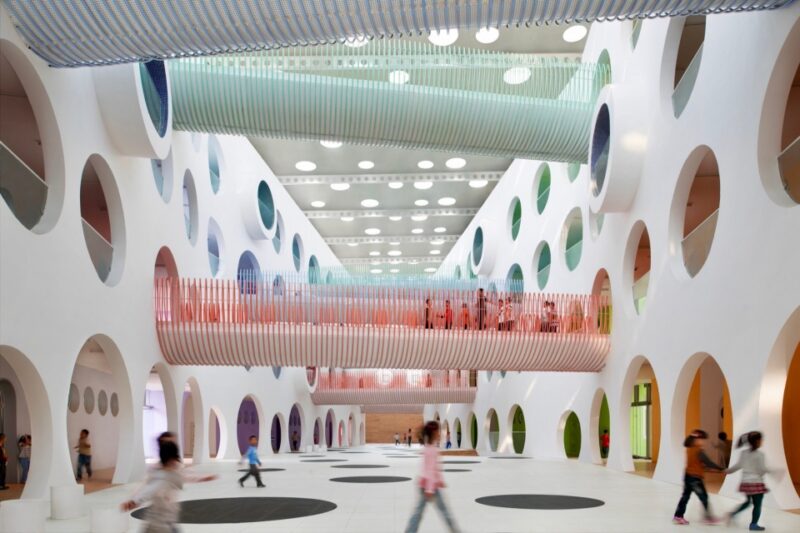项目位于成都苏坡街道清源社区,毗邻苏坡公园,坐落在清源公园绿带之中,周边多所学校围绕。成都关于“苏坡”的地名均源于一座古桥——苏坡桥。
The project is located in Qingyuan Community, Supo Block, Chengdu, adjacent to Supo Park, located in the green belt of Qingyuan Park, surrounded by many schools. The names of “Supo” in Chengdu all come from an ancient bridge — Supo Bridge.
∇ 总平面图 ©小隐建筑
苏坡桥,始建于明代,为四洞三墩带长廊的青石拱桥。宋元佑年间,文学家苏轼任翰林学士,曾在成都城南杨柳堤讲学。出于对苏东坡的崇敬,人们将他来往的这座桥改名苏坡桥。如今,苏坡桥虽已不在,但成都人对于东坡先生的崇敬一直延续至今,成都还有不少以苏坡为名的地名,如苏坡街道办事处、苏坡路、苏坡公园、苏坡立交桥等;亦如《温江县志》中前人咏叹苏坡桥的诗句:“客去亭何在,桥空水长流”。
The Supo Bridge, built in the Ming Dynasty, is a bluestone arch bridge with four holes and three piers and a long corridor. The writer Su shi of Song Dynasty as academician, had given lectures at the bank of Yangliu in the south of Chengdu. Out of respect for Su Dongpo (Su shi), the bridge he traveled over was renamed as Su Po Bridge. Today, although the Supo Bridge no longer exists, but the reverence of Mr. Dongpo from citizens of Chengdu has continued to this day. Chengdu has a lot of places named after Supo, such as Supo Street Office, Supo Road, Supo Park, Supo Overpass and so on. For example, in the “Wenjiang County Records”, poem the ancient people lamented Supo Bridge: “Where the visitors, where the pavilion, the bridge is empty and the water still runs “.
∇ 苏坡桥 ©董邦达(清) 四川全图
项目建筑意象便起源于这座消失的苏坡桥,我们将苏坡桥的“廊桥”作为建筑意象,试图用现代建筑语言勾勒一些苏坡廊桥的影子,拾忆廊桥。
The architectural image of the project originates from the disappeared Supo Bridge. We take the “corridor” of Supo Bridge as the architectural image, and try to redraw the shape of Supo Bridge with modern architectural language, bringing the memory of the bridge back.
∇ 鸟瞰图 ©存在建筑
∇ 展廊全景透视 ©存在建筑
∇ 苏坡艺廊夜景 ©存在建筑
项目处于成都西面居住密集的区域,前期作为“兴城建·玉润金沙”的销售展示中心,方圆一公里内大多数建筑都是近些年来开发的居民住宅,距离项目500米范围内现已配套了三个幼儿园、两个小学、两个中学,加之“苏坡讲学”的文化基底,书香氛围浓郁。但周边建筑缺乏学校之外的文化延展公共空间,建筑后期将作为清源社区小型艺展公共建筑向大众开放,以增加社区文化氛围,配套周边公园形成一个可静可动的中小型游园。
The project is located in a densely populated area in the west of Chengdu, functioning as a sales exhibition center in the early stage. Most buildings around within a mile are residential buildings developed in recent years. Besides, the project forms a complete set of the three kindergartens, two primary schools and secondary schools within 500 meters, together with the cultural history of “Su Po lecture”, it’s a community with strong artistic atmosphere. However, the surrounding buildings lack public space for cultural extension outside the school. In the later stage, our architecture will be opened to the public as a small public art exhibition area in Qingyuan Community, so as to increase the cultural atmosphere of the community, but also form a medium-sized garden that can be static and energetic by supporting the surrounding parks.
∇ 临街广场透视 ©存在建筑
∇ 临街透视 ©存在建筑
遵循经济、环保的设计原则,项目前后功能的转化不允许空间结构的改动和过多的成本投入,在设计之初团队就对整个空间架构做了双重考虑,合理规划了现下和未来不同功能建筑空间的人流动线,结合团队贯彻的意象建筑理论,提出了可以同时满足艺展和销售展示中心功能需求的“廊桥”方案。“廊桥”的建筑意象亦能让这个建筑不那么的“建筑”,它更似玉带廊桥横跨在场地之上,将街头绿地有趣的串联起来。
Following the design principle of economy, environmental protection, the transformation of functions before and after the project of conversion is not allowed to changes of space structure and high construction price, so our team think the spatial organization carefully at the beginning of the design stage. “Corridor Bridge” Concept satisfying the function requirements of art and sales exhibitions at the same time comes out, not only reasonable planning for current and future circulations, but also combining with the image architectural theory we insist. The architectural image of “Corridor Bridge” makes this building less of an “architecture” visually as well. It is more like the Jade Belt crossing over the site, connecting the green spaces of the block in an interesting way.
∇ 局部鸟瞰 ©存在建筑
∇ 环形内庭 ©存在建筑
∇ 入口庭院 ©存在建筑
因为后期使用功能为开放型公共建筑,区别于常见的封闭院落式销售展示中心,建筑集中为一个整体,以环抱的姿态融合周边公园及街道空间。宽处为房,整合多种功能空间需求于一处;窄处为廊,开放为公共空间,营造前期销售展示功能入户感的同时,兼顾建筑与周边公园“亲切的距离感”,也是塑造文化展览空间的一种仪式感。
Because the function of the later use is an open public building, which is different from the common closed courtyard-type sales & Exhibition center, the building is concentrated as a whole and integrates the surrounding park and street space in an embracing attitude. The wide part is private, which integrates various functional space requirements in one place; the narrow part is a corridor with open public space. While creating a sense of entering into the home in the early stage, it also gives consideration to the “sense of friendly distance” between the building and the surrounding park, which is also a sense of ceremony shaping the cultural exhibition space.
∇ 户外展廊 © inVIEW影喻影像-肖波
整个建筑似几层廊架叠合而成,“廊桥”意象油然而生。在东侧临公园绿地建筑立面及建筑内部空间也延续了“廊桥”意象。建筑总共两层,竖向交通空间除了室内互通的楼梯和电梯之外,另将两部楼梯外置在东侧立面,形成首尾相衔的空中廊桥,四扇通透开敞的大玻璃也一定程度呼应了历史上“四洞三墩”的苏坡桥。多楼梯分散布置,除了解决各空间的疏散问题之外,还为建筑不同功能划分和运营管理提供了必要的通路和不同的进出方式。
The whole building is like several layers of corridors stacked together, the image of “Corridor Bridge” arises spontaneously. The image of “covered bridge” is also continued in the facade and interior space of the building adjacent to the park on the east side. The building has a total of two floors. In addition to the interlocking stairs and elevators in the interior, two other staircases are placed outside on the east side, forming an aerial corridor bridge as well. The four large transparent and open glazing also echo the “four holes and three piers” of the Supo Bridge in history to a certain extent. Distributed multiple staircases not only solve the evacuation issue of each space, but also provide necessary access and different access methods for each function division and operation management of the building.
∇ 展廊夜景透视 ©存在建筑
∇ 临街夜景透视 ©存在建筑
∇ 展厅、咖啡厅夜景透视 ©存在建筑
室内的“廊桥”根据一楼不同建筑空间的层高变化,在二楼形成了一定高差,我们运用悬空坡道将其消化,在不影响无障碍通行的前提下,为建筑提供了一些节奏性的游览乐趣。
The interior “Corridor Bridge” forms a certain height difference on the second floor according to the height changes of different spaces on the first floor. We use the suspended ramp to solve the height difference and provide some rhythmic pleasure for the building without affecting the accessibility.
∇ 展厅、咖啡厅 © inVIEW影喻影像-肖波
入口50米的半室外长廊和西侧临路主界面的白色格栅,强化建筑整体性的同时弱化建筑感,从格栅穿透的柔和阳光与水面反射的粼粼波光交织成一幅灵动的画卷,光影亦是展品,更是空间流动的气韵。通过室内外组合形成一条长150米的展览长廊,能承载多种类型的小型艺展活动,周边居民多了一处消遣之地。东侧临公园绿地一侧空间的全落地玻璃,把自然引入室内;可结合书吧、咖啡、茶饮等休闲业态形成一定的艺术性经营空间,“自我造血”贴补艺展空间的日常运营,解决当下多数公共建筑的营生难题。
The 50-meter semi-outdoor corridor at the entrance and the white louvers at the main interface facing roads on the west side strengthen the integrity of the building while weakening the sense of mass. The soft sunlight through the louvers and the sparkling light reflected from the water interweave into an elegant picture scroll. Light and shadow are also exhibits, but also the flowing spirit crossing through the space. A 150-meter long exhibition corridor is formed through the combination of indoor and outdoor, which can carry a variety of small art exhibition activities and provide a place for the surrounding residents to relax. Full floor-to-ceiling glazing on the east side of the space adjacent to the park green space introduce nature into the interior. A certain artistic commercial space can be formed by combining book bar, cafe and tearoom, and “self-hematopoietic” can supply the daily operation of art exhibition space in order to solve the commercial problems of most public buildings at present.
∇ 总平面图
∇ 苏坡艺廊一层平面图 © 小隐建筑
∇ 苏坡艺廊二层平面图 © 小隐建筑
∇ 苏坡艺廊剖面图 © 小隐建筑
∇ 苏坡艺廊展览流线示意图 © 小隐建筑
项目信息
项目地址:成都市青羊区清波路
建筑面积:1420平方米
设计时间:2020年1月-2020年4月
主要材料:白色水泥纤维板、铝板、铝合金格栅、艺术涂料、灰色水磨石板
Site Location:Qingbo Road, Qingyang District, Chengdu
Area:1420 sqm
Design Period:2020. 1 – 2020. 4
Materials:White cement fibrolite plate, aluminum panel, aluminum alloy louver, artistic coating、grey waterstone plate
建筑设计:小隐建筑事务所(Archermit)
主创建筑师:潘友才、杨喆、陈仁振
结构工程师:杜旭
设计团队:胡沁梅、何仪、苟源君、刘欣悦、梁贵生
建筑施工图配合单位: 四川华胜建筑规划设计有限公司
Architecture Firm:Archermit
Principal Architects:Youcai Pan, Zhe Yang, Renzhen Chen
Structural Engineer:Xu Du
Design Team: Qinmei Hu, Yi He, Yuanjun Gou, Xinyue Liu, Guisheng Liang
Architecture Construction Cooperation Company: Sichuan Huasheng Architectural Planning and Design Co., Ltd
室内设计:LID莱特筑造(成都)
主创设计师:肖波 王轶
Interior Design:LID (Chengdu)
Principal Designers:Bo Xiao, Yi Wang
软装设计:成都卡萨洛维奇装饰工程设计有限公司
主创设计师:唐光平
Decoration Design:Chengdu Casarovic Decoration Engineering Design Co., Ltd
Principal Designer:Guangping Tang
景观设计:成都塞纳园境设计咨询有限公司
主创设计师:孟繁良
Landscape Design:Chengdu Senna Landscape Design Consulting Co., Ltd
Principal designer:Fanliang Meng
业主单位:成都市兴城建置业有限责任公司
施工单位:成都建工集团有限公司
摄影:存在建筑 inVIEW|影喻影像——肖波
Proprietor company:Chengdu XingchengJian Estates Co., Ltd
Construction company:Chengdu Construction Co., Ltd
Photography:Arch-exist,inVIEW-Bo Xiao









































